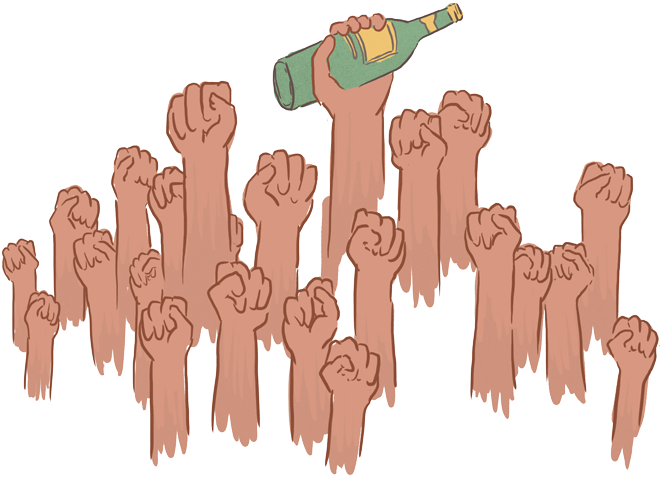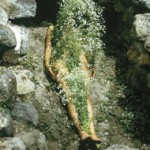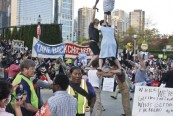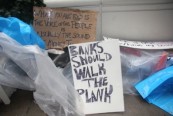
The facts are rather unreliable; I know that I went to sleep in New York City, maybe Brooklyn, and woke up in downtown Chicago. I had been traipsing around Manhattan, getting a feel for a city that once was so familiar, not set alight with a foreign spirit neither of us really understands. And then the city, the phantom, the fire was all gone.
Waking up to find oneself in a different city than where one went to sleep is a terrible way to start off any given week. My colleague, E– and I had been talking for weeks about the Beat writers, Hunter S. Thompson and Tom Wolfe – a generation of writers and journalists who in the midst of anxious times chose to “turn on, tune in, [and] drop out” (as Timothy Leary said). But that phrase and that time in history refer to psychedelic drugs. Leary, in the last decade of his life revised the term to “turn on, boot up, jack in” responding to what he saw as the “LSD of the ‘90s” – the PC.
After all, what reality could be better than virtual reality?
I keep to myself on a Red Line train headed for a grimy, lovable slab of cold concrete. G– might be waiting – I’m not sure. It’s hard not to jump in and out of turn with myself on trips like these. “Who the fuck am I talking to,” I mumble metaphysically, eyes forward, back straight, lips sealed. This is no time for slouching.
My mind is the word jumble among cash register tabloids, and I start to wonder about the folks in the streets above my head. All NPCs to me. Non-playable characters. “If this was a video game, I’d hope to be the protagonist,” I slur to myself unconsciously. [slump] Dammit, I’m a journalist. And if I retain even a single shred of dignity and lucidity, I can attempt to translate an untranslatable song. Half of the equation lay rattling in a bottle in my bag, potent and flammable. The evening’s golden calf was toxic teenage ambrosia – fuel and tool and treasure map.
But until my ride is over, my words are short and my thoughts are long, and that is the incurable ailment of the overdressed and unenthused.
But this isn’t an elegy. In a moment of true bohemian nostalgia, we unearthed a bottle of absinthe. Sure, it smelled like anise-laced mouthwash, and caused us to cough and tear up like adolescents. Fuck Thompson, Wolfe and Leary. Fuck Gysin, Burroughs and Kerouac. In a true moment of nihilistic bohemianism we thought why not “pour one out” for the ultimate bohemian of days past: Toulouse Lautrec.
We cannot recommend that anyone ever follow in our footsteps. Within 15 minutes of consuming a few glasses of the Green Fairy, our eyes were wide, bright and shallow, and we chattered excitedly about everything that flitted through our minds. As the afternoon wore on, we found that what was once entirely green was entirely gone.
I was delirious and forgetful. It’s the nature of the job.Spending my hours in a box of poorly climate-controlled air, I get distracted easily.The endless IV of coffee didn’t hurt either.Shaky, withered, eyes glazed over in a perennial Tuesday morning hangover – I was hungry for something strange.
It was at that moment that we heard a clatter outside our windows. Rushing across the room, pushing aside carelessly placed chairs and knocking stacks of paper over, we pressed our faces to the cool, single-paned glass to see a beast moving up Michigan Avenue. A dragon? It seemed to have someone in it’s teeth – no, two! A king and a priest.
“I need to go see this!” my counterpart yelled.
“No! You’ll get eaten!” I cry chasing after her.
We beat down the stairs, panicked and spill out onto the street. The dragon vanished and instead a sea of human bodies pushed through us, up to East Monroe St. The king, the priest and the banker floated atop the crowd, effigies of the new public enemy. We stepped forward into the mass and were swept away, up to the front door of the Modern Wing, where a vignette was being enacted. We paused, and looked around at the crowd, a general assortment of unionized workers, students, children and Occupiers. But over the signs and the beat of the drums, there was the flashing of lights, the constant strobe of flashbulbs going off. If he didn’t have a voice, he had a camera. Whoever said the revolution would not be televised had not conceived of one-touch editing and mobile uploading. I put away my camera.
I took out my camera. Oh, I remember days in the park before the horses came. When everyone was naive and here to take pictures of a large bean that showed you a distorted image of yourself. But now the horses were here. They were shitting in the street. It was a strange day for everybody.
I think as soon as I hit the street and found my footing, I went into full-on zombie apocalypse mode. The streets were bare except for the concentrated mass of marchers and the helmets on calmly stern faces. The air had no smell that evening, but it had a balmy, wet taste. Later in the night, I would proclaim to G–, “I’m just going to take shaky photos the whole time.” What I didn’t know was that this was a comment out of time – I would take three photographs after having said it; I would take 157 before.
The crowd seemed to assemble in layers, like an onion, with the trembling onlookers at the periphery and the Robin Hoods and puppet kings at the dense nucleus. I am at the center, feeling like a retrovirus. I don’t remember the high-visibility clothing. I don’t remember the leaf-stained banner. I don’t remember the sidewalk arrests. I don’t remember the raucous voices. I don’t remember the bandwagoners. I remember the hairs sticking up on the back of my neck, telling me to keep shooting. I remember deciding when to stop.
An Armed Flaneur
Just as we had been swept in, so too we found ourselves suddenly alone, meandering down deserted streets and babbling to each other about what we had just seen.
“We were in a crowd of 10,000 people earlier. And no one got hurt. There was no skull bashing.”
“I was a little disappointed at that. I wanted a little bit of action.”
“Dragging…”
“Yeah.”
“You see videos of protesters in New York and they’re resisting the cops and suddenly they’re screaming, ‘My asthma! My asthma! I need my inhaler!’”
“Yeah! That’s what I wanted to see! Some blood. I wanted that visceral bloodlust.”
“I, too, like a little bit of splatter in all of my art.”
We didn’t really know where we were going, just that we were tripping around a city in some sort of post-coital slumber. The air, though hot and thick, betrays a passion that isn’t yet at rest.
As the night fell, green fairies gave way to orange halos.This was airport lighting – a dim, decrepit beacon against the horrors of the night, which we were wading through, seemingly fearlessly.The danger was gone and the unknown became the inevitable. We ambled our way left, right and straight, through more of the same cold slabs of lovable concrete, talking our way down from the blood buzz of rushing towards a front line.
The word, the idea is on everyone lips but no one’s even whispering it: revolution. We are doctors, constantly taking the pulse of a terminally ill patient, just waiting to pronounce time of death. But things have changed since the time of Baudelaire and Lautrec. Since the time of those bastard Beat writers. The Flaneur of the past is a person of removed investment, to whom the actions on the street are mere folly, musings with no bearing on his own life. For a Flaneur to utter “revolution” is for him to make a judgement call that has no bearing on his life, but gravely for those on the streets. But no one here utters revolution, because none of us are Flaneurs – we are all participants.






















[…] Written by Georges Negri and Emily Vélox Originally published in F Newsmagazine, November 2011. […]